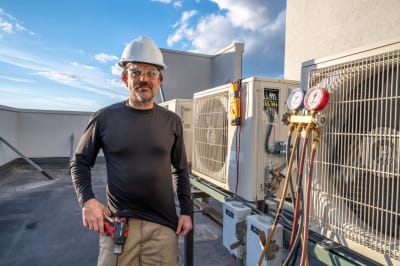Plumbers in West Virginia improve the quality of life for numerous individuals and communities all over the state. They contribute to sustainable water management and solving complex plumbing issues, making day-to-day living much more convenient.
The beauty is that anyone can become a plumber in West Virginia. The path is straightforward, and the educational requirements are minimal relative to other professions.
If you want to consider a career in the field, this page is the right place to start. Below you’ll find all the critical information you need to get started, such as the different educational requirements and alternatives, the best training programs to consider, and the potential salary to look forward to, among others.
How to Become a Plumber in West Virginia
Step 1: High School Diploma or GED
Apart from being required to enroll in training programs and apprenticeships, a high school diploma or GED prepares future plumbers for the challenges they’ll face.
Subjects such as mathematics, science, and computer science are all useful during a plumbing career.
Step 2: Training Programs
Training programs for plumbers can be divided into three broad categories - trade school/college programs, apprenticeship programs, and fast-tracked programs.
Trade Schools
Even though no law mandates a university education, many plumbers in West Virginia usually consider obtaining one anyway to have a solid theoretical foundation to build their careers upon.
They also get to graduate with a certificate or associate degree that gives them an edge when it’s time to apply for jobs.
Apprenticeship
Apprenticeship programs provide immediate real-world experience and mentorship for interested candidates. It is also possible for an apprenticeship program to incorporate some classroom training in addition to its hands-on sessions.
Fast-Tracked Plumbing Course
Fast-tracked plumbing programs take between 8 to 10 weeks to complete. For this reason, they are usually an attractive alternative for aspiring plumbers looking to get started as fast as possible.
Step 3: Work Experience
To start working and obtain a license, work experience is an essential factor. Vocational and college programs typically find a way to incorporate this aspect into their coursework. In contrast, apprenticeship programs last a couple of years, during which real-world experience is the main objective.
Those who attend a fast-tracked program may fulfill this requirement by working as a plumber’s assistant.
Licensure and Certification Requirements
West Virginia plumbers must be licensed before they can perform plumbing work. The available licensing categories include apprentice, journeyman, master, and contractor.
Candidates start as apprentices through the “Plumber in Training” license by being at least 18 years old and working under the supervision of a licensed plumber. They tend to become “Journeyman Plumbers” by completing the training program and passing the written licensing exam with a score of at least 70%.
Master plumbers have acquired more than a year of experience as Journeyman Plumbers. Lastly, master plumbers can become Plumbing Contractors by applying for a Contractor License from the West Virginia Division of Labor.
Learn about plumber licensing and certification in neighboring states:
Top Plumbing Schools in West Virginia
1. Putnam Career and Technical Center
The Putnam Career and Technical Center remains a veritable destination for future plumbers in West Virginia. It is currently one of the state’s most popular plumbing training programs.
The program requires around 1080 hours of instruction to complete. This usually takes one to two years. Focus topics include blueprint reading, pipes, fitting assembly, diagnostics, etc.
2. Carver Career and Technical Education Center
Carver Career and Technical Education Center is another viable alternative for future plumbers in West Virginia. The focus here is on crucial plumbing topics that will help graduates secure valuable employment. Students are also prepared for certification examinations such as the NCCER and OSHA certifications.
3. West Virginia Higher Education Policy Commission
West Virginia Higher Education Policy Commission, through its 12 campuses, offers high-quality plumbing training at affordable costs.
Applicants may opt for a certificate/diploma or associate degree program. Focus areas include assembly installation and maintenance of piping fixtures for steam, natural gas, and industrial processing systems.
Explore Plumbing Schools by City:
Salary and Job Outlook
Plumbers in West Virginia earn an average annual salary of $47,637. Those in the top 10% of earners take home $72,080 annually, while those in the bottom 10% take home $31,483 annually.
Location is one of the most critical factors determining how much a plumber earns in West Virginia. For instance, plumbers in Martinsburg earn the highest annual average at $56,512, while those in Harpers Ferry and Wheeling follow with $55,050 and $52,257, respectively.
Plumbers in Charleston earn an annual average salary of $46,700.





